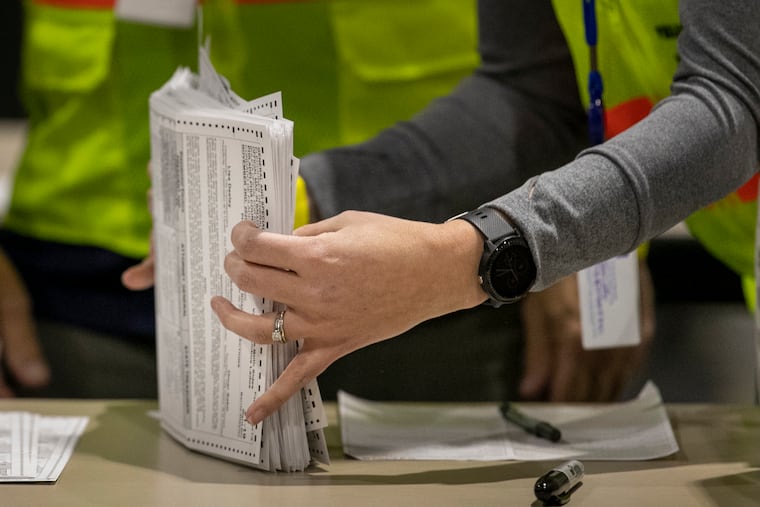Pa. elections official blames spreadsheet for state’s mistake in certifying a county’s election results
The error is the latest black eye for a department that has been under heightened scrutiny and partisan attack for its administration of elections.

A top elections official said Monday that “human error” in tracking the results of the May 17 primary election led Pennsylvania to inadvertently certify a county’s vote counts that the state deems to be inaccurate.
The embarrassing revelation came in a filing before Pennsylvania’s Commonwealth Court, where the state is seeking to break a standoff with three counties — Berks, Fayette, and Lancaster — that refuse to include undated mail ballots in their official totals in defiance of guidance from the Department of State. The department, which oversees elections, sued the counties last month, asking a judge to order them to do so.
But in a court filing Monday, Jonathan Marks, the deputy elections secretary, acknowledged that a fourth county, Butler, had also refused to count those ballots — and that the county had notified the department three weeks before the lawsuit was filed.
Marks apologized to the court for what he described as an oversight resulting from “a manual process” — a spreadsheet — the department had used to track which counties were counting undated ballots. Butler County was misclassified in the spreadsheet, he said, and from that point forward was left out of the state’s campaign to push counties that hadn’t included them.
As a result, the state didn’t include Butler County in its lawsuit. It certified the county’s election results along with 63 other counties.
The mistake complicates the lawsuit — and raises new questions
The news that Butler County had also refused to count undated ballots was first revealed in letters the state and Fayette County sent to Commonwealth Court last week. Monday’s filings from the department sought to explain how the mistake had occurred.
The revelation that the state had relied on updating a spreadsheet — a process that allowed an error to be made and then not caught later — is the latest black eye for a department that has been under heightened scrutiny and partisan attack for its administration of elections.
And the department’s internal processes have failed before in a high-profile way. Former Secretary of State Kathy Boockvar, who oversaw the 2020 election, stepped down last year after the department didn’t advertise a constitutional amendment, as state law requires. The failure to perform a legally required administrative task raised questions about procedures inside the department, which has since said it had bolstered its systems and instituted additional levels of scrutiny.
Department officials said in their filings Monday “they do not intend to take further action with respect to Butler County” despite the certification mistake.
A spokesperson declined to elaborate. The statewide races for governor and U.S. Senate have not yet been certified because of the lawsuit, and it’s unclear whether the department will use the Butler County results it sees as flawed.
If the department is willing to accept them, it complicates its argument in court that the three defiant counties must count undated ballots. After all, it would essentially be fighting for those three counties to count undated ballots while allowing a fourth county to exclude them.
In a filing Monday, Fayette County lawyer Thomas W. King III urged the court to dismiss the current lawsuit, citing the mix-up with Butler County.
If the court were to rule at this point, he wrote, “all of the Butler County election results which have been certified … will need to be ‘recertified’ without any legal authority.”
The certification crisis highlights existing problems and questions of vote counts
Monday’s filing came amid a slow-rolling certification crisis that has also highlighted existing weaknesses in the state’s electoral system and underscored the impotence of the Department of State to compel counties to follow its electoral guidance.
The state oversees elections, but counties are ultimately the ones charged with running them. And in that dynamic, counties hold much of the power.
State law requires voters to handwrite the date on the outer envelopes of their mail ballots. But earlier this year, the U.S. Court of Appeals for the Third Circuit ruled that those dates were immaterial to whether a vote had been validly cast and shouldn’t prevent ballots missing a date from being counted.
The ruling was specific only to a 2021 Lehigh County judicial race, but the Department of State has taken the position that its logic should apply to all election results in all counties going forward — including the May primary.
The president judge of Commonwealth Court, Renée Cohn Jubelirer, issued a similar preliminary ruling in an election dispute between GOP Senate primary rivals Mehmet Oz and David McCormick in June, though McCormick dropped out of the race and dropped his lawsuit before a final ruling was issued.
But the legal landscape around undated ballots remains unsettled. Republicans have appealed the Third Circuit ruling to the U.S. Supreme Court and have discounted the Commonwealth Court decision since a final ruling in the case was never issued.
In its letter to the Department of State, Republican-leaning Butler County said it “would not be canvassing ballots which are not compliant with the statutes of this Commonwealth.”
Fayette, Berks, and Lancaster Counties have taken similar stances — and the state, outside of appealing to the courts, has little power to compel counties to do what it wants.
That left the department in the position of either certifying results that it knew were an uneven patchwork across the state, with some counties including the undated ballots and others throwing them out, or trying to get a court to sort the matter out.
Cohn Jubelirer heard arguments in the case at the end of July. She has not laid out a timeline for when she intends to rule on the case.